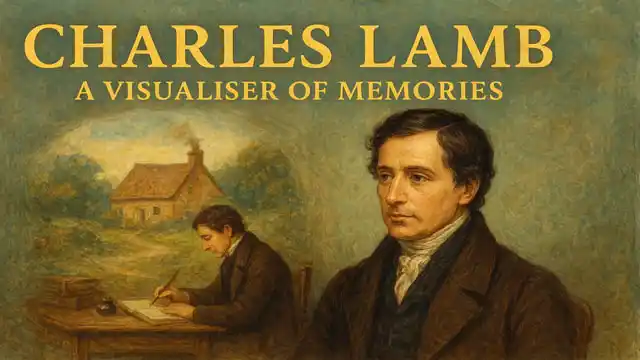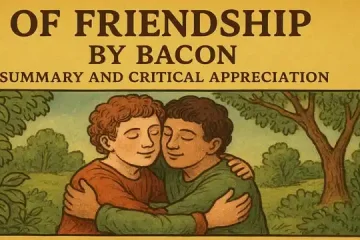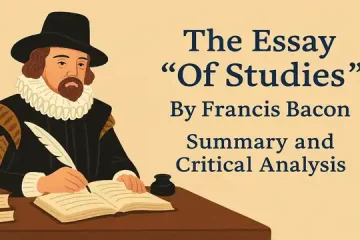Charles Lamb, Reveller of His Past Memories:
Lamb as a Reveller of Memories:
Lamb is the best reveller of his past memories. Charles Lamb, a visualiser of Memories, plays the best tune of his past life on the present guitar. His essays are haunted with the pictures of his past life. In his every essay he takes the reader into his deep attached confidence and makes him travel on the back of past carriage. His past descriptions are wonderful vivid and living. Undoubtedly Lamb has a marvellous power of visualising. He makes us wander in his past experience in such manner as we are in the present. There is a great force in his revelation.
Realistic Effect of His Essays:
We have a feeling after we have read the essay that we will recognise these people if we meet them in real life. In his essays he drives past vehicles in such a way as he is seated in the present well modified and technified and makes the reader feel at every step the happening of his . No moment is wasted when he switched on the button of the past memories and speaks in what actual had happened. He not only loiters to the close of persons and places but falls in his personality through his description.
His sights are never bed – sleep but real, he only coloured them with his best quality of mystification. He leans on the blend of humour and pathos and moves on with fact and fiction. The old things, if they are traditionally or customary, may be rotten, but his past memories always look fresh, bright and active when in the unique mind of Lamb . They become interesting, if melancholic or pleasureful. “Lamb sucked all the Juice from the live his past life and poured it in his essay with humour, pathos, fact and fiction.”
Lamb as a Star in English Literature:
“Lamb is only the star which appears in the dense clouds and shines in English literature as a brilliant visualiser and self reveller.”
The South-Sea House:
“The South – Sea House” is a good example of Lamb’s power of visualising memories. Although the memories narrated here are not entirely first – hand, because it seems that some of these were supplied to him by his brother John, yet the pictures are wonderfully and vivid and living. At first he makes the readers past wander in his beautiful description the building of historic office. In his Good – heavens and marvellous description, he remembers, “Such is the South – Sea House. At least such it was forty years ago, when I know it.” After describing its face, subject, location and importance, he makes feel the presence of persons working there as clerk.
He describes their nature, behaviour, outlooks and tendency. He says, “The clerks in South – Sea House, had an air very different from those in the public – offices that I have had to do with since. They were mostly bachelors. Generally they were persons of curious and speculative turn of mind. They were “Old – fashioned”, “humorists”, “a sort of Noha’s Ark”, “Odd fishes”. He rides on the back of past and gives us individual portrait of the cashier, a walesh man named Evans. Thomas Tame was the deputy cashier and the accountant, named John Tipp. The others were also existed there.
Christ’s Hospital Five and Thirty Years Ago:
“Christ’s Hospital Five and Thirty years Ago” is supposed to be a counterblast in which Lamb dealt with his past memories at this famous charity school. Lamb recalls tasteless and inadequate meals which were served to the boarders at school. Lamb recalls his experience of loneliness and home – sickness in the cloak of Coleridge: “I felt myself alone among six hundred playmates.” His home – sickness is clearly shown here: “How, in my dreams, would my native town come back; with its Church, and trees, and faces! How I would wake weeping, and in the anguish of my heart exclaim upon sweet clane in Wiltshire!”
He recalls the tyrannical attitude to which the younger boys were subjected by the masters and monitors. The oppressions of these young brutes were heart – sickening. He recalls the incident of one of the boys, named Hodges who kept a donkey as a pet in the dormitory and forced to all the boys to spare half of their food for it and so the students had to suffer from half starvation.
He travels back in the case of the unfortunate fellow who, at the cost of his good name, used to feed the rest collected gags to his destitute parents. He recalls the varying degrees of punishment, inflicted on the offenders at school. For the first offence in fetters, second to be confined to a dungeon and third to be scourged brutally.
He recalls the two schoolmasters, James Boyer and Matthew Field, and their dealing manner with their students. Dwelling upon the task of collecting memories may be impossible and idle Job for another author but for Lamb pleasure giving. All these memories in this essay have been projected in such a wonderful manner as they seem wandering in the present.
Other Essays of Reminiscence:
In “The Old and the New Schoolmaster”, Lamb recalls his sudden happening experience of travelling in the company of a schoolmaster. In “Imperfect Sympathies”, Lamb recalls the incident happened at a way side inn where three Quakers took their tea, and recalls the curious behaviour of these persons.
In “Poor Relation”, Lamb recalls the frequent visits of Mr. Billit to his father’s house, and the occasion how he felt his insult when, once he was insisted to take another slice of pudding, he refused. At this his aunt said to him “Do take another slice, Mr. Billet, for you do not get pudding every day.” He also recalls one of his fellows W- (Favel) of Christ’s Hospital. He recalls his tragic case due to poverty of his father. His fellow’s ambitions were shattered badly. Favel left the university and joined the army. He was among the first who perished before the walls of St. Sebastion.
The Old Benchers of the Inner Temple:
“In The Old Benchers of the inner Temple”, Lamb recalls his early memories. He recalls the vanished glories of the temple of older London (Temple, a London district where Lamb was born), and then he goes on to give us fine memories of the various residents of that locality. He recalls the first bencher, Thomas Coventry, was the massive lion faced. Coventry breathed authority and terror by his mere presence.
Samuel Salt was a much milder man. Lovel (his own father) was Salt’s assistant. About him Lamb goes on to give us memories: “I knew this Lovel. He was a man of an incorrigible, and losing honesty. A good fellow withal, and would strike.” Further adds, “L. was the liveliest little fellow breathing, had a face as gay as Garrick’s whom he was said greatly to resemble, possessed a fine turn for humorous poetry.
Lamb recalls Peter Pierson who was a benevolent, but not a handsome man. Next to him he recalls old Barton a “Jolly negation.” Other benchers were Daines Barrington, Mingay and Baron Maseres. This essay resembles “The South – Sea House” and “Christ’s Hospital Five and Thirty years Ago” in containing memories of persons.
My Relations:
“My Relations” contains Lamb’s recollections of his aunt: “I had an aunt, a dear and good one”. In this essay, Lamb gives us memories of his brother John Lamb, “Cousin James.” In the essay he gives only a brief sketch of his aunt Hetty and the rest of the essay is devoted to a pen – portrait of his brother John.
Grace Before Meat:
“In Grace Before Meat”, Lamb recalls the Company of the two Methodist priests: “I once drank tea in the company with two Methodist divines of different persuasions, whom it was may fortune to introduce to each other for due first time that evening. Before the first cup was handed round, one of these reverend gentleman put it to the other, with all due solemnity whether he chose to say anything.
Dream Children:
In “Dream Children”, Lamb recalls his grandmother, Field: “How religious and how good their great – grandmother Filed was”. Here he recalls one part of his brother, John: “How he used to carry one upon his back when I was lame – footed boy.” Then he recalls how seven long years, sometimes in hope and sometimes in despair, he courted the fair lady Alice W – n, it was Anne Simmons). Thus, this essay is replete with the memories of his boyhood, lonely life of his grandmother and pen – portrait of John.
The Praise of Chimney-Sweepers:
In “The praise of Chimney – Sweepers”, Lamb recalls the incident of a young Chimney – Sweeper gleefully laughing at the spectacle of Lamb’s having slipped and fallen in the street: “There he stood, pointing me out with his dusky finger to the mob, and to a poor women in particular, till the tears for the exquisiteness of the fun worked themselves out at the corners of his poor red eye.” He also recalls his friend Jem White who had endeared himself to all the chimney – Sweepers by his practice of giving them a grand dinner once every year. This dinner was meant only for the younger sweepers.
A Bachelor’s Complaint:
In “A Bachelor’s Complaint”, Lamb recalls the various humiliations to which he was subjected in the course of his visits to his married friends. He recalls one of the occasions when he became victim of mortification, made by a wife, Testacea (an imaginary Latin name): Testacea, for instance, kept me the other night two or three hours beyond my usual time of supping, while she was, pretting because Mr. – did not come home till the oysters were all spoiled, rather than she would be guilty of the impoliteness of touching one in his absence.
At the same Lamb recalls his another mortification, by Cerasia (here, also another imaginary Latin name): “Who at her own table sent away a dish of Morellas, which I was applying to with great good will, to her husband at the other end of the table and recommended a plato of less extraordinary gooseberries to my unwedded palate in their stead.”
Recollections as the Essence of His Essays:
The recollections and reminiscences are integral colours of his essays. Without these there is no taste and interest in his essays. So, the recollections of the past are vital ingredient in the essays of Lamb. In his essays there is immortal touch of his past memories. The mixture prepared with his memories makes his essays a delicious juice which the reader drinks and wants more. Nothing is left of such essays as “The South Sea House”, “Christ’s Hospital Five and Thirty years Ago”, “Dream Children”, “The old Benchers of the inner Temple”, “My Relations” and “The Superannuated Man.”




